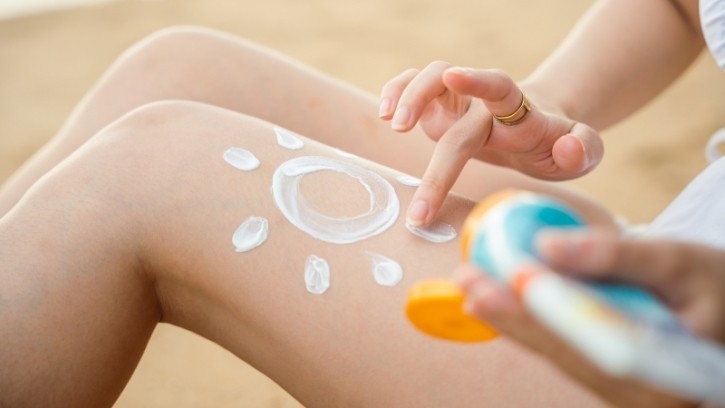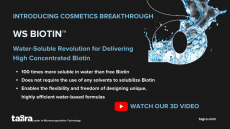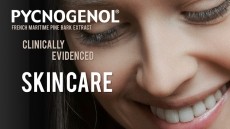New research reveals active benefits of UV filters to preserve skin microbiome – dsm-firmenich

Researchers at dsm-firmenich have undertaken a clinical study to explore the effects of UV filters on the skin microbiome when exposed to UV radiation.
Although the skin microbiome has been a focus for more beauty and personal care companies in recent years, there has been a lack of data on the protective role of UV filters on the skin microbiome until now.
The study showed the impact of UV radiation on microbial composition and confirmed the active benefit of sunscreen to preserve its protective function.
According to Michele Marchini, Head of Global Marketing Photoprotection at dsm-firmenich, the research: “provides valuable guidance for developing enhanced sun care formulations that protect and nurture the skin microbiome – and ultimately lead to enhanced overall skin health.”
For the study, 10 pre-menopausal subjects were recruited, with each providing skin samples from four different skin zones on their upper middle back (eg untreated/unexposed, untreated/exposed, placebo and SPF20 treated on exposed skin). The time points just before and at exactly two hours after erythemal UV exposure (two Minimal Erythema Doses) were considered. The samples were collected by skin swabbing for the microbiome analysis by 16S rRNA gene sequencing.
Protection of beneficial skin bacteria
The research specifically found that the bacteria Lactobacillus crispatus (L. crispatus), which is also present on human skin, helps to preserve microbial balance, thereby maintaining the skin barrier function and resilience. The study revealed that this bacterium is especially sensitive to UV exposure but can be protected by applying a sunscreen with a combination of the following UV filters: PARSOL® 340, PARSOL® ZX, PARSOL® 1789 and PARSOL® EHT. These combinations are proven to support beneficial skin bacteria and maintain an abundance of L. crispatus in the UV radiated skin microbiome, as a line of defence against UV radiation.
"L. crispatus abundance gets depleted when we age,” reveals dsm-firmenich’s Dr. Rolf Schuetz (PhD). “It has a key function in the vaginal microflora and is commonly used in probiotic treatment. It is also known to preserve the balance of a healthy microbiome and prevents pathogen invasion. It produces lactic acid, creating an acidic environment and releases antimicrobial compounds. Consequently, L. crispatus is a component of the innate immune system.”
Inhibition of harmful skin bacteria
The research also showed in vitro that potential overpopulation of Cutibacterium acnes (C. acnes) bacteria in the skin microbiome, which some strains have been linked to the formation of inflammatory acne, could be diminished with certain UV filters (such as PARSOL® 1789, PARSOL® EHS and PARSOL® 340).
This research paves the way for developing customised sun care for acne-prone skin.
Looking at the survival rates of individual bacteria in an UV-induced in vitro model, some filters specifically reduced C. acnes population, while keeping other bacteria in good shape, such as avobenzone, octisalate, and octocrylene,” said Dr. Schuetz. “As a result, a smart selection of the UV filters in a sunscreen might reduce the C. acnes population and mitigate inflammatory acne breakouts. These findings suggest the preferred use of those filters for mild sunscreen formulations that target acne-prone skin.”
The company says that the study shows the appropriate combination of UV filters can protect skin from health issues and help to support it by keeping the microbiome in healthy balance. As Marchini puts it: “A sun-protected skin microbiome will ultimately strengthen natural skin resilience – which translates into a more youthful appearance and better skin health over the long term.”
Building on this research, dsm-firmenich says it can now provide sun care developers with guidance on which microbiome-friendly UV filter combinations that can be used to create a new wave of skin resilience-strengthening formulations, for the increasingly microbiome-conscious consumer.
For example, UV filters such as PARSOL® 1789, PARSOL® Shield and PARSOL® EHT, all allow maximum SPF while protecting these bacterial species. Flor’Active Defense SPF 30, a first-to-market microbiome-friendly sunscreen formulation (certified by MyMicrobiome.info), was also proven to respect the skin’s microbial diversity, protect against UV irradiation and support skin health.
Free Whitepaper

Probiotic Powerhouses & Pioneers: Top 10 acquisition targets for growth in the APAC region
Looking to expand your presence in Asia? Download this whitepaper today to see our top 10 picks for acquisition targets.







![Chinese study highlights mental health challenges in atopic dermatitis, emphasising holistic patient care. [Getty Images]](https://www.cosmeticsdesign-europe.com/var/wrbm_gb_food_pharma/storage/images/_aliases/wrbm_tiny/publications/cosmetics/cosmeticsdesign-asia.com/headlines/formulation-science/chinese-research-linking-atopic-dermatitis-to-mental-health-underscores-need-for-holistic-care/17040623-1-eng-GB/Chinese-research-linking-atopic-dermatitis-to-mental-health-underscores-need-for-holistic-care.jpg)








